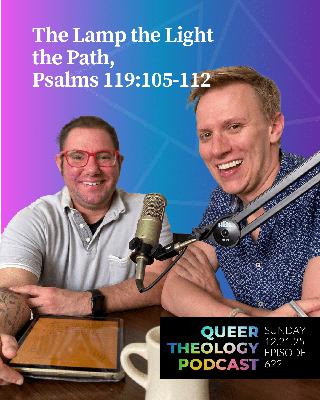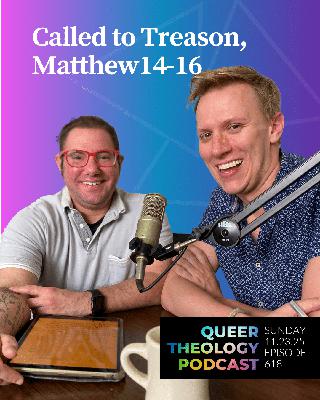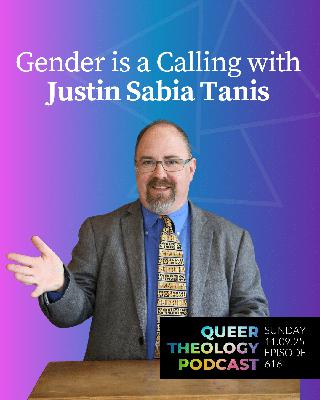Queering Isaiah 58: Communal Restoration and Justice
Description
We are queering the whole chapter of Isaiah 58 in this week’s episode. There is so much in this chapter, especially when we look at themes of justice, community, and personal reflection. It’s especially interesting to look at how this chapter resonated with our younger selves and how we view it today. There is emphasis on the importance of treating marginalized individuals with care and the communal nature of faith. We feel called in this chapter to foster growth and imagination, focusing on our own unique gifts that come with queerness.
Takeaways
- Isaiah 58 calls for justice and community care.
- Personal faith should reflect how we treat others.
- Communal restoration is a key aspect of faith.
- Revisiting scripture can lead to personal growth.
- Navigating privilege is essential in faith discussions.
- Sabbath is a time for rest and reflection.
- Imagining a better world is crucial for progress.
- Articulating a collective dream is necessary for change.
- Community support is vital for individual growth.
- Engagement with scripture fosters deeper understanding.
Chapters
(02:59 ) Personal Reflections on Faith and Justice
(06:02 ) The Communal Nature of Faith
(09:12 ) Revisiting Scripture: Growth and Reflection
(12:07 ) Navigating Privilege and Safety
(14:49 ) The Importance of Sabbath and Rest
(18:04 ) Imagining a Better World
(21:03 ) Articulating Our Collective Dream
(24:00 ) Conclusion: Community and Next Steps
Resources:
- Join our online community at Sanctuary Collective Community
If you want to support the Patreon and help keep the podcast up and running, you can learn more and pledge your support at patreon.com/queertheology
This transcript was generated by AI and may contain errors or omissions.
Welcome to the Queer Theology Podcast. I’m Brian G Murphy. And I’m father Shannon, T l Kearns. We’re the co-founders of Queer Theology dot com and your hosts From Genesis to Revelation. The Bible declares good news to LGBTQ plus people, and we want to show you how Tune in each week on Sunday for conversations about Christianity, queerness and transness, and how they can enrich one another. We’re glad you’re here.
(2m 49s):
Hello, Hello, Hello and welcome back to the Queer Theology Podcast. Today we’re gonna go back to our roots yet again, and we’re gonna queer a passage from scripture. Today we’re gonna be looking at Isaiah 58, the whole chapter. Shay’s gonna read it for us in just a moment from the common English Bible. If you would like to pull up your Bible and read along, we would love to have you otherwise. Here is Isaiah 58. Shout loudly. Don’t hold back. Raise your voice like a trumpet. Announce to my people, their crime, the house of Jacob, their sins. They seek me day after day, desiring knowledge of my ways, like a nation that acted righteously, that didn’t abandon their God. They ask me for righteous judgements, wanting to be close to God.(3m 30s):
Why do we fast? And you don’t see why afflict ourselves, and you don’t notice yet on your fast day, you do whatever you want and oppress all your workers. You quarrel and brawl, and then you fast. You hit each other violently with your fists. You shouldn’t fast as you’re doing today. If you wanna make your voice heard on high. Is this the kind of fast I choose? A day of self affliction, of bending one’s head, like a read and of lying down in morning clothing and ashes? Is this what you call a fast day acceptable to the Lord? Isn’t this the fast I choose? Releasing wicked restraints and tying the ropes of a yolk, setting free the mistreated and breaking every yolk, isn’t it sharing your bread with the hungry and bringing the homeless poor into your house, covering the naked.(4m 14s):
When you see them and not hiding them and not hiding from your own family, then your light will break out like the dawn and you’ll be healed quickly. Your own righteousness will walk before you and the Lord’s glory will be your rear guard. Then you’ll call and the Lord will answer. You’ll cry for help. And God will say, I’m here. If you remove the yoke from among you, the finger pointing, the wicked speech, if you open your heart to the hungry and provide abundantly for those who are afflicted, your light will shine in the darkness and your gloom will be like the no. The Lord will continually, the Lord will guide you continually and provide for you even in parched places. He will rescue your bones. You’ll be like a watered garden, like a spring of water that won’t run dry.(4m 57s):
They will rebuild ancient ruins on your account and foundations of generations past. You’ll restore, you’ll be called mender of broken walls, restore of lable streets. If you stop trampling the Sabbath, stop doing whatever you want on my holy day and consider the Sabbath of the Lord honored and honor it. Instead of doing things your way, seeking what you want and doing business as usual, then you will take delight in the Lord. I will let you ride on the heights of the earth. I’ll sustain you with the heritage of your ancestor, Jacob. The mouth of the Lord has spoken. Oh, amen. This is the word of the Lord.(5m 38s):
Oh, I love this passage. Yeah, it really brings me back this passage, or at least part of this passage, my first or second year in New York City. I observed lent for the first time, and every day on my lunch break, I would sneak away from my office job in my cubicle, And I would go to a nearby church And I would sit in the back pew. It was like it was open to the public, but like there weren’t services happening. And I would read the psalms and the prophets And I, I think that I like almost every day read a portion of this passage, if not the whole passage. And like the, is this, isn’t this the fast I chose releasing wicked restraints, untying the ropes of a yoke, setting free, mistreated, and breaking every yoke.(6m 20s):
I would read at least that if not the whole passage, like every, every day. ’cause you know, lunch is a fasting holiday, I guess you would call a holiday. And so like, sort of like recentering, like this is the type of fast, right? And I remember being like, I was relatively newly out. I’d probably been out for, I don’t know, four or five years, And I was recently outta college And I was just sort of like, oh, it’s like so freaking hard to be queer and everyone is against us and the church misunderstands us and they’re focused on all of the wrong things and like, this is what we should care, But we should care about justice. And I remember being like, I am one of the oppressed and like God wants the yoke of my oppression to be broken.(7m 5s):
And I do also remember being like, And I get to partner in other types of justice work to break other types of oppression. But like that the church, the church quote unquote, like writ large was sort of like missing the mark. And so I remember being really inspired by this and, and, but like sort of like schooled by a, like a righteous indignation sort of away. So I, this like really takes me back And I’m, it’s interesting now all these years later to see things I didn’t quite catch the first time around. Yeah. I, I love, I love this passage. I mean, the first part I like, the first response is always I read this And I’m like, are are evangelicals just like not reading scripture?(7m 49s):
Like I don’t understand because I think about like how my church growing up would’ve interpreted this passage and it would’ve been, I mean, a, a shit show, but like Right, It, it would’ve been like, well then you just need, you’re, you’re doing too much on Sunday, right? That is the message that they would read, they would take out of this passage of like, you have to like honor the quote unquote Sabbath better and like, Go to Church more, which is like the total opposite of what this passage is saying, which is like, part of what you’re doing wrong is you’re like being a dick on the like the most holy day.(8m 30s):
So like, get it together. But I’m, I’m so struck by how, once again, like how communal these, these prophetic texts are and how, and so many of the texts and scripture, like it’s not about me and my personal relationship with the divine. It’s like how am I treating my, am I treating the most marginalized i
























